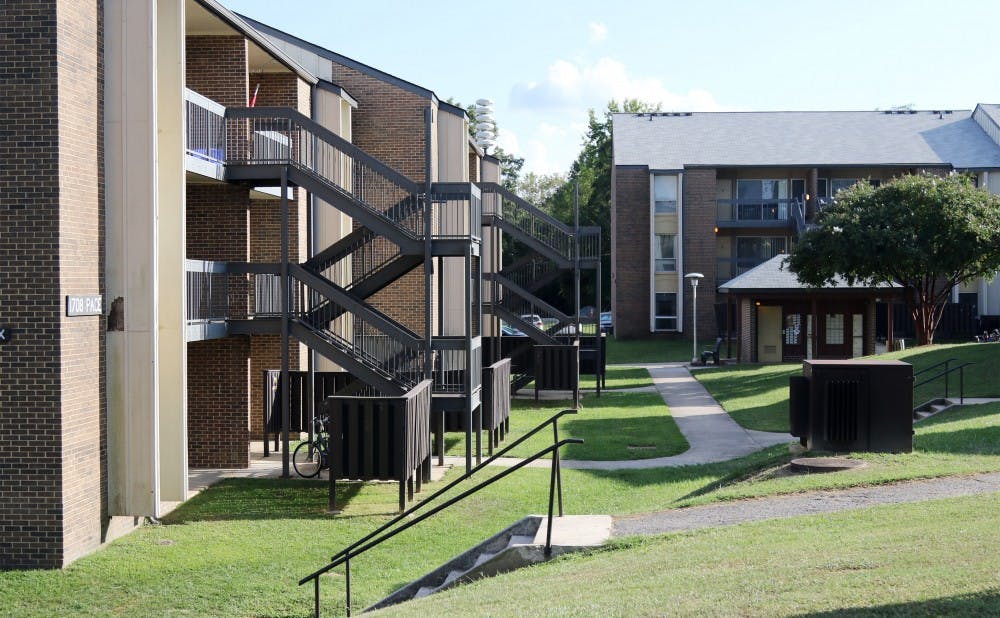Although most Duke students tuned in to Duke-Kentucky at 7:30 p.m. Tuesday, a few skipped the game to voice their grievances about living conditions on Central Campus.
The event was sponsored by Housing, Dining and Residence Life and Duke Student Government in order to give residents an opportunity to voice their concerns about recent health and safety issues in the apartments, which were built in the 1970s. Joe Gonzalez, dean for residential life, acknowledged the poor scheduling of Tuesday’s forum, as the start time coincided with the tip time of No. 2 Kentucky’s 74-63 win against the No. 5 Blue Devils.
“If I had known there was a game today, I would have chosen a different day to hold the forum,” he said.
The forum was supposed to be an opportunity for students to ask questions about HDRL’s response with Matthew Stiegel, safety and health Specialist in the Duke Occupational and Environmental Safety Office, Wayne Thomann, assistant professor of community and family medicine in the School of Medicine and Andy Beville, director of facilities planning and operations.
“The amount of people here today isn’t representative of the amount of residents that have concerns,” said a student at the forum.
Students in attendance noted that common problems in their apartments include cockroaches in bathrooms, extreme condensation, mold and that HDRL fails to adequately respond to these issues. They also complained about staff finding temporary solutions, such as stuffing cardboard into a hole through which spiders were entering apartments, and ignored maintenance work requests. Many called for an improved email system that would confirm work requests were sent in and provide updates about potential follow-up responses.
“There’s clearly a lack of communication between students and maintenance,” said junior George Mellgard, DSG vice president for residential life, referring to the numerous posts on the Fix My Campus Facebook page calling for action.
Attendees also voiced their desire for guidelines that could provide information about when an issue becomes a serious health concern and when to submit work requests.
“For a lot of us, this is the first time we’ve lived in a home like this without our parents and where it’s up to the students to bring up these concerns,” said a student forum attendee. “We don’t really know when to bring it up to HDRL. It’s our responsibility to tell you what’s going on and if we’re unaware what’s going on, then that can be hard.”
Thomann attempted to provide guidelines, noting that condensation and mold often arise from water sources and outside infiltration. He explained that when air conditioners are on and windows are slightly open, there is a high likelihood of mold spores coming indoors and growing. Most organisms found inside can be traced to the surrounding environment.
He suggested students request HDRL to inspect the apartment if they are concerned and then seek to identify sources of water intrusion.
“Another important thing to prevent infiltration is cleaning,” Steigel added. “Vacuuming and taking care of your apartment can really help.”
Beville noted that the most common sources of spore development are towels.
Central Campus living conditions have long been a concern for students. A number of problems have been reported in the past year alone, including bats, insects, asbestos, water damage and reported black mold.
In addition to health concerns, sophomore Sara Waite asked whether Central Campus was built with the intent of being a permanent living area.
“Central Campus is clearly not permanent,” said Gonzalez. “It’s not intended to be a hundred-year campus and isn’t meant to be here as long as the buildings on East and West. We’re looking to recreate a new Central, though we don’t have an exact window on that.”
Get The Chronicle straight to your inbox
Signup for our weekly newsletter. Cancel at any time.

